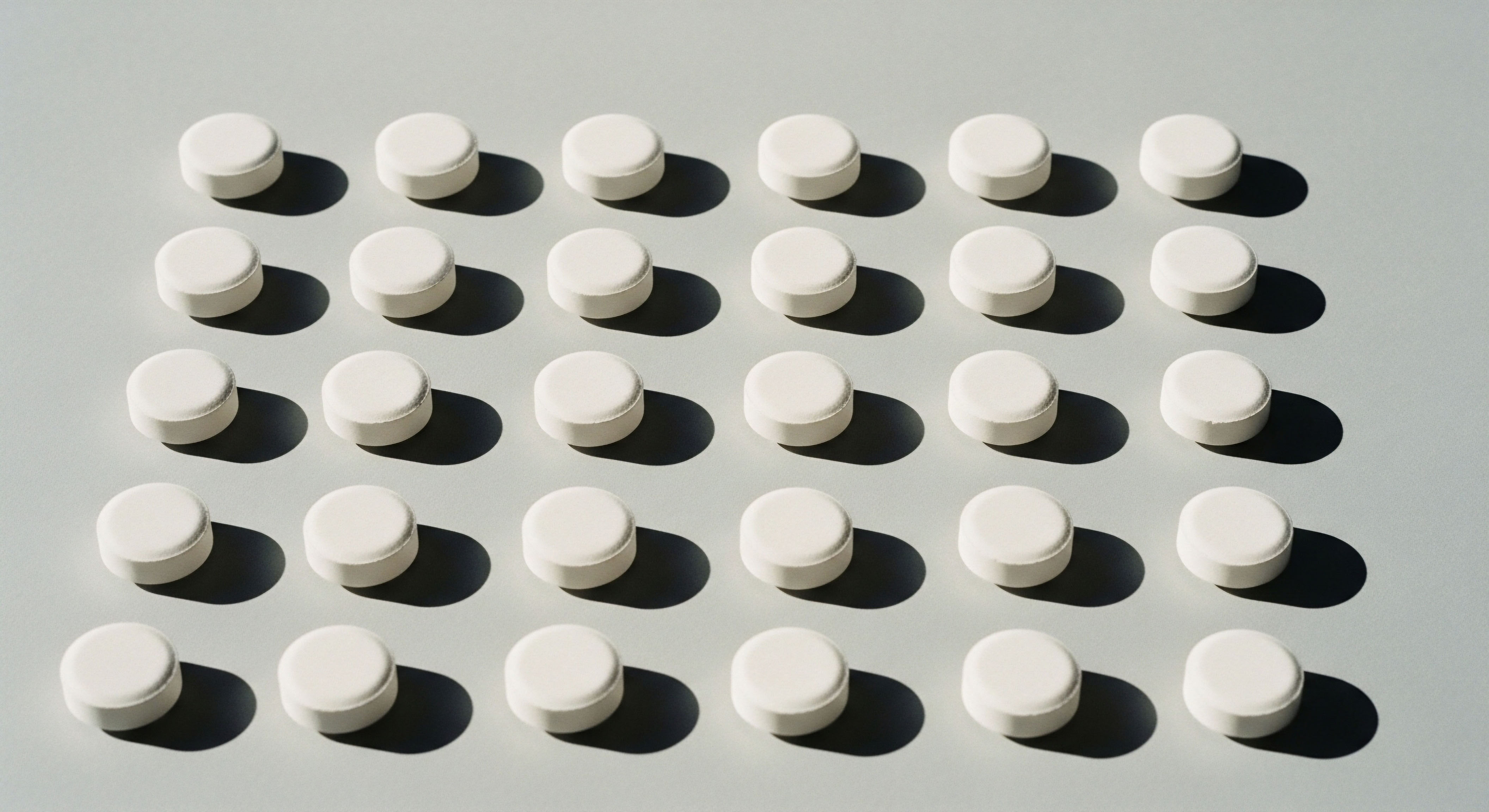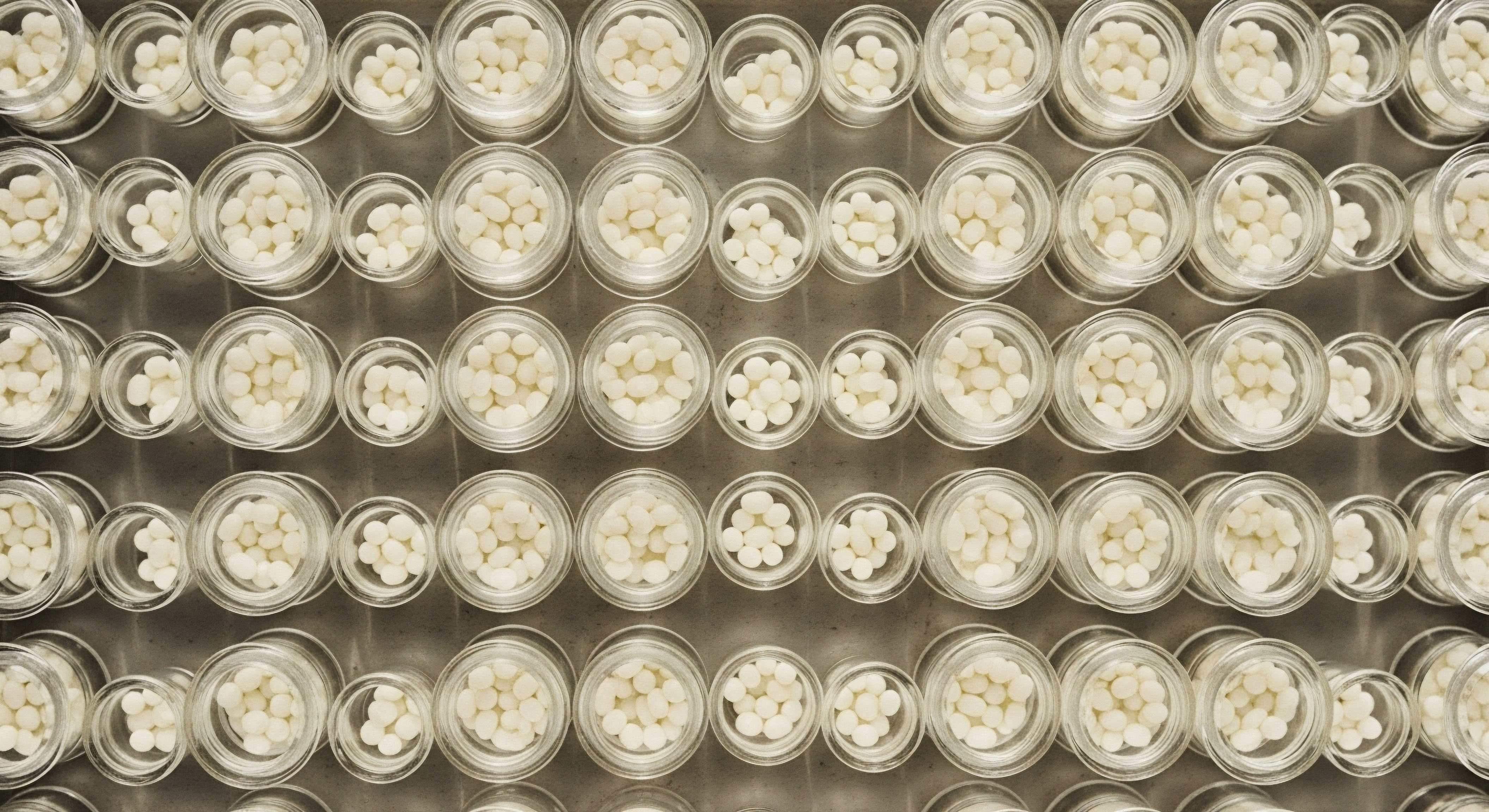

Fundamentals
The conversation around hormonal health Meaning ∞ Hormonal Health denotes the state where the endocrine system operates with optimal efficiency, ensuring appropriate synthesis, secretion, transport, and receptor interaction of hormones for physiological equilibrium and cellular function. often begins with a feeling. It could be a persistent lack of energy, a noticeable shift in mood, or the sense that your body is no longer responding as it once did. When you are also managing a cardiovascular condition, these feelings can become entangled with a layer of caution and concern.
The decision to explore something like Testosterone Replacement Therapy Meaning ∞ Testosterone Replacement Therapy (TRT) is a medical treatment for individuals with clinical hypogonadism. (TRT) becomes a deeply personal one, weighing the desire to reclaim vitality against the need to protect your heart. It is a valid and important consideration. Your body is an interconnected system, and understanding how hormonal signals influence cardiovascular function is the first step toward making an informed choice that aligns with your health goals.
Testosterone is a primary signaling molecule in the male body, responsible for a vast array of functions that extend far beyond libido and muscle mass. It plays a role in maintaining bone density, regulating red blood cell production, and even influencing cognitive function and mood.
Think of it as a key that unlocks specific processes within your cells. When testosterone levels decline, either due to age or other health factors, these cellular processes can become less efficient. For individuals with pre-existing cardiovascular conditions, this decline can be particularly significant. Research suggests that low testosterone Meaning ∞ Low Testosterone, clinically termed hypogonadism, signifies insufficient production of testosterone. levels are associated with an increased risk of cardiovascular disease. This creates a complex picture where both low testosterone and the therapy to correct it require careful consideration.

The Heart and Hormones a Delicate Balance
Your cardiovascular system Meaning ∞ The Cardiovascular System comprises the heart, blood vessels including arteries, veins, and capillaries, and the circulating blood itself. is a dynamic network of blood vessels, and the heart is its powerful engine. The health of this system depends on a multitude of factors, including blood pressure, cholesterol levels, and the flexibility of your arteries. Testosterone interacts with this system on several levels.
It can influence the production of red blood cells, which carry oxygen throughout your body. It can also affect the way your body processes lipids, or fats, in the blood. For someone with a history of heart disease, any therapy that interacts with these mechanisms must be approached with a clear understanding of the potential effects.
The initial assessment for TRT in the context of cardiovascular health Meaning ∞ Cardiovascular health denotes the optimal functional state of the heart and the entire vascular network, ensuring efficient circulation of blood, oxygen, and nutrients throughout the body. involves a thorough evaluation of your current cardiac status. This includes a detailed medical history, a review of your current medications, and a comprehensive panel of blood work. The goal is to establish a clear baseline from which to measure the effects of any hormonal intervention.
This foundational knowledge is what allows for a personalized protocol, one that is designed to optimize your hormonal health while respecting the unique needs of your cardiovascular system.
Understanding the interplay between your hormones and your heart is the starting point for a safe and effective wellness journey.
It is also important to recognize that the relationship between testosterone and cardiovascular health Meaning ∞ Testosterone and cardiovascular health refers to the complex interrelationship between the primary male sex hormone, testosterone, and the functional integrity of the heart and blood vessels. is not a simple one-way street. While low testosterone may be a risk factor for heart disease, the presence of heart disease can also impact your hormonal health.
Chronic conditions can place a significant strain on the body’s resources, potentially affecting the intricate feedback loops that regulate hormone production. This is why a holistic approach is so important, one that considers the whole person, not just a single lab value or symptom.
The journey into hormonal optimization Meaning ∞ Hormonal Optimization is a clinical strategy for achieving physiological balance and optimal function within an individual’s endocrine system, extending beyond mere reference range normalcy. when you have a cardiovascular condition is one of careful steps and close monitoring. It is a partnership between you and your clinical team, built on a foundation of open communication and shared decision-making.
The aim is to restore balance to your endocrine system in a way that supports, rather than compromises, your cardiovascular well-being. This process begins with understanding the fundamentals of how these two powerful systems communicate and interact within your body.


Intermediate
When considering Testosterone Replacement Meaning ∞ Testosterone Replacement refers to a clinical intervention involving the controlled administration of exogenous testosterone to individuals with clinically diagnosed testosterone deficiency, aiming to restore physiological concentrations and alleviate associated symptoms. Therapy (TRT) for an individual with a history of cardiovascular disease, the standard protocols require thoughtful modification. The objective shifts from simply elevating testosterone levels to a target range to a more nuanced recalibration of the endocrine system with a constant focus on cardiac safety.
This involves a careful selection of the therapeutic agent, precise dosing strategies, and the integration of ancillary medications to manage potential side effects that could impact cardiovascular health. The protocol is no longer a one-size-fits-all template; it becomes a dynamic and responsive plan tailored to the individual’s unique physiology and medical history.
The choice of testosterone ester is a primary consideration. Testosterone Cypionate, administered via intramuscular or subcutaneous injection, is a common choice due to its predictable release and stable blood levels. For a patient with cardiovascular concerns, the goal is to avoid the peaks and troughs that can accompany other delivery methods, as these fluctuations can potentially place stress on the cardiovascular system.
The starting dose is often conservative, allowing the clinical team to observe the body’s response and make gradual adjustments based on follow-up lab work and patient feedback. This slow and steady approach minimizes the risk of adverse events and allows for a more controlled optimization process.

How Are TRT Protocols Adjusted for Cardiac Patients?
The adjustments to a TRT protocol for a patient with cardiovascular disease Meaning ∞ Cardiovascular disease refers to a collective group of conditions impacting the heart and blood vessels, frequently involving narrowed or blocked arteries that can lead to myocardial infarction, stroke, or heart failure. are designed to mitigate specific risks. One of the primary concerns is the potential for an increase in red blood cell count, a condition known as erythrocytosis.
While a modest increase is expected with TRT, an excessive rise can thicken the blood, potentially increasing the risk of clotting events. To manage this, the protocol will include regular monitoring of hemoglobin and hematocrit levels. If these markers rise above a predetermined threshold, the testosterone dose may be reduced, or the patient may be advised to donate blood to lower their red blood cell volume.
Another key area of focus is the management of estrogen. Testosterone can be converted into estrogen in the body through a process called aromatization. While some estrogen is necessary for male health, excessive levels can lead to side effects such as water retention and gynecomastia, which can be particularly concerning for patients with heart conditions.
To control estrogen levels, an Aromatase Inhibitor (AI) like Anastrozole Meaning ∞ Anastrozole is a potent, selective non-steroidal aromatase inhibitor. is often included in the protocol. The dosing of Anastrozole is highly individualized and is based on sensitive estrogen testing to ensure that levels are maintained within an optimal range.
A TRT protocol for a cardiac patient is a dynamic plan that prioritizes stability and risk mitigation through careful dosing and monitoring.
The following table outlines a sample modified TRT protocol for a patient with a history of stable cardiovascular disease, highlighting the key components and their rationale:
| Component | Protocol Detail | Cardiovascular Rationale |
|---|---|---|
| Testosterone Cypionate | Initial dose of 100mg/week, administered as two 50mg subcutaneous injections. | Smaller, more frequent injections help maintain stable blood levels, avoiding hormonal peaks that could stress the cardiovascular system. |
| Anastrozole | 0.25mg twice a week, adjusted based on sensitive estradiol testing. | Controls estrogen levels to prevent water retention and other side effects that could exacerbate cardiac conditions. |
| Gonadorelin | 500mcg twice a week, subcutaneous injection. | Maintains testicular function and natural hormone production, contributing to a more balanced endocrine profile. |
In addition to these core components, the protocol will also emphasize lifestyle modifications that support cardiovascular health. This includes dietary guidance to manage cholesterol and blood pressure, as well as a structured exercise program to improve cardiac function and insulin sensitivity. The goal is to create a synergistic effect, where the hormonal optimization protocol and a heart-healthy lifestyle work together to improve overall well-being.
The inclusion of Gonadorelin Meaning ∞ Gonadorelin is a synthetic decapeptide that is chemically and biologically identical to the naturally occurring gonadotropin-releasing hormone (GnRH). is another important aspect of a well-rounded protocol. By stimulating the pituitary gland, Gonadorelin helps to maintain the body’s own testosterone production and preserve fertility. This supports the Hypothalamic-Pituitary-Gonadal (HPG) axis, the body’s natural hormonal feedback loop. For a patient with cardiovascular concerns, maintaining the integrity of this system is beneficial, as it promotes a more stable and predictable hormonal environment.
The journey of hormonal optimization with a cardiovascular condition is one of precision and partnership. It requires a clinical team with expertise in both endocrinology and cardiology, as well as a patient who is engaged and committed to the process. By implementing a carefully modified protocol and closely monitoring key biomarkers, it is possible to achieve the benefits of TRT while prioritizing the long-term health of the cardiovascular system.


Academic
The intersection of testosterone physiology and cardiovascular health is a field of ongoing scientific inquiry, with a growing body of evidence suggesting a complex and multifaceted relationship. Historically, concerns about the potential cardiovascular risks of Testosterone Replacement Therapy (TRT) have been a significant consideration in clinical practice.
However, recent large-scale studies have provided a more reassuring perspective, suggesting that for men with hypogonadism, TRT does not appear to increase the risk of major adverse cardiovascular Initiating TRT post-cardiac event is possible with careful timing, stabilization, and rigorous medical oversight to balance benefits and risks. events. This has shifted the focus of academic discussion towards understanding the nuanced mechanisms through which testosterone modulates cardiovascular function and how these effects can be leveraged to optimize patient outcomes, particularly in those with pre-existing cardiac conditions.
From a molecular perspective, testosterone exerts its effects on the cardiovascular system through both genomic and non-genomic pathways. The genomic pathway involves the binding of testosterone to androgen receptors within the cells, leading to changes in gene expression that can influence a wide range of cellular processes.
For example, testosterone can modulate the expression of genes involved in lipid metabolism, potentially leading to a more favorable lipid profile with lower levels of total and LDL cholesterol. The non-genomic pathways are more rapid and involve the direct interaction of testosterone with cell membranes and signaling molecules, leading to effects such as vasodilation and improved blood flow. Understanding these dual mechanisms is critical to appreciating the full spectrum of testosterone’s cardiovascular effects.

What Is the Current Evidence on TRT and Cardiovascular Events?
A landmark study in this area is the TRAVERSE trial, a large, randomized, placebo-controlled study that specifically investigated the cardiovascular safety Meaning ∞ Cardiovascular safety refers to the comprehensive assessment and mitigation of potential adverse effects on the heart and vascular system stemming from medical interventions, pharmaceutical agents, or specific physiological states. of TRT in middle-aged and older men with hypogonadism and a high risk of cardiovascular disease.
The results of this trial, published in the New England Journal of Medicine, showed that TRT was non-inferior to placebo in terms of the incidence of major adverse cardiovascular events. This finding has been instrumental in alleviating some of the long-standing concerns about the cardiovascular risks of TRT. However, the study also noted a higher incidence of atrial fibrillation and pulmonary embolism in the testosterone group, highlighting the need for careful patient selection and ongoing monitoring.
The following table summarizes the key findings from the TRAVERSE trial, providing a snapshot of the current evidence on the cardiovascular safety of TRT:
| Endpoint | Testosterone Group | Placebo Group | Hazard Ratio (95% CI) |
|---|---|---|---|
| Primary Composite Endpoint (MACE) | 7.0% | 7.3% | 0.96 (0.78-1.17) |
| Atrial Fibrillation | 3.5% | 2.4% | 1.52 (1.09-2.11) |
| Pulmonary Embolism | 0.9% | 0.5% | 1.90 (1.02-3.53) |
These findings underscore the importance of a personalized approach to TRT, particularly for patients with a history of arrhythmias or thromboembolic events. The decision to initiate therapy should be based on a comprehensive risk-benefit analysis, taking into account the patient’s individual cardiovascular profile and treatment goals. The data also suggests that while the overall risk of major adverse cardiovascular events Initiating TRT post-cardiac event is possible with careful timing, stabilization, and rigorous medical oversight to balance benefits and risks. is not increased, there may be specific risks that require careful management and monitoring.
Current evidence supports the cardiovascular safety of TRT for major events in hypogonadal men, but highlights the need for vigilance regarding specific risks like atrial fibrillation.
The impact of TRT on inflammatory markers is another area of active research. Chronic inflammation is a key driver of atherosclerosis, the underlying cause of most cardiovascular disease. Some studies have suggested that testosterone may have anti-inflammatory properties, potentially by reducing the production of pro-inflammatory cytokines.
This could be one of the mechanisms through which TRT exerts its beneficial effects on the cardiovascular system. However, the evidence is not entirely consistent, and further research is needed to fully elucidate the complex interplay between testosterone, inflammation, and cardiovascular health.
The following list details some of the key areas of ongoing research in the field of testosterone and cardiovascular health:
- Endothelial Function ∞ Investigating the direct effects of testosterone on the endothelial cells that line the blood vessels, and how these effects influence vasodilation and blood flow.
- Metabolic Effects ∞ Exploring the impact of TRT on insulin sensitivity, glucose metabolism, and body composition, and how these changes translate to cardiovascular risk reduction.
- Genetic Factors ∞ Identifying genetic variations that may influence an individual’s cardiovascular response to TRT, paving the way for more personalized treatment strategies.
In conclusion, the academic understanding of the relationship between testosterone and cardiovascular health has evolved significantly in recent years. The evidence from large-scale clinical trials has provided a greater degree of confidence in the cardiovascular safety of TRT for appropriately selected patients.
The focus of future research will likely be on refining our understanding of the underlying mechanisms and identifying strategies to further optimize the cardiovascular benefits of hormonal therapy while minimizing potential risks. This will require a continued commitment to rigorous scientific investigation and a collaborative approach between endocrinologists, cardiologists, and basic science researchers.

References
- Healthline. “Testosterone Therapy and Heart Attack Risk ∞ What You Need to Know.” 2023.
- Kloner, Robert A. et al. “Testosterone and the Heart.” Reviews in Urology, vol. 18, no. 1, 2016, pp. 1-10.
- Gencer, Baris, and Peter J. V. K. N. “The Effect of Testosterone on Cardiovascular Disease and Cardiovascular Risk Factors in Men ∞ A Review of Clinical and Preclinical Data.” The American Journal of Medicine, vol. 133, no. 8, 2020, pp. 894-904.
- Cedars-Sinai. “Research Finds Testosterone Therapy Safe for Heart Health.” 2024.
- Lincoff, A. Michael, et al. “Cardiovascular Safety of Testosterone-Replacement Therapy.” New England Journal of Medicine, vol. 389, no. 2, 2023, pp. 107-117.

Reflection

Charting Your Own Path to Vitality
The information presented here is a map, a detailed guide to the complex terrain where hormonal health and cardiovascular well-being intersect. It is designed to provide you with the knowledge to ask informed questions and to engage in a meaningful dialogue with your clinical team.
Your personal health journey is unique, a story that is still being written. The decision to explore any therapeutic path is a significant one, and it is a decision that is yours alone to make.
Armed with a deeper understanding of your own biological systems, you are now in a position to take a more active role in shaping the next chapter of your health story. The path to renewed vitality is one of partnership, precision, and proactive engagement. It is a path that begins with the courage to seek answers and the wisdom to apply them to your own life.









